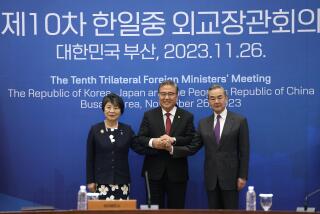China, Japan agree on steps to ease tensions ahead of APEC summit
- Share via
Reporting from Beijing —
After more than two years of intense tension, China and Japan said Friday that they had reached an agreement to improve relations fractured by a territorial dispute and visits by Japan’s prime minister to a controversial war shrine.
The breakthrough comes as Beijing is set to welcome about 20 world leaders, including Japanese Prime Minister Shinzo Abe, for an Asia Pacific Economic Cooperation summit. Speculation had been running high in recent weeks that the forum might provide an opportunity for Abe to engage face-to-face with Chinese President Xi Jinping.
After holding talks with Japan’s national security advisor, Shotaro Yachi, at the Diaoyutai state guesthouse in Beijing, Chinese State Councilor Yang Jiechi announced the “four-point” agreement on getting the relationship back on track.
“For reasons known to all, China-Japan relations have encountered persistent and serious difficulty,” China’s Foreign Ministry said in a statement. “In recent months, the two sides have conducted rounds of consultations through the diplomatic channel to overcome political obstacles in the bilateral relations.”
The two sides said they had agreed to “gradually resume political, diplomatic and security dialogue through various multilateral and bilateral channels” and to “make efforts to build political mutual trust.”
On the territorial dispute over a group of islands known in China as the Diaoyus and in Japan as the Senkakus, the two sides pledged to “prevent the situation from aggravating through dialogue and consultation and establish crisis management mechanisms to avoid contingencies.”
It was unclear whether Abe had agreed to refrain from further visits to the Yasukuni Shrine in Tokyo, which honors Japan’s millions of war dead, including a number of high-ranking war criminals from World War II. Abe’s visit to the shrine last year was met with furious denunciations in China, which Japan occupied from 1931 to 1945.
Yang Yiwei, director of the Institute for International Affairs at Renmin University, said this week that a promise from Abe to avoid further visits to the site was a precondition for any substantive Abe-Xi meeting at APEC. Beijing also wanted a formal acknowledgment from Tokyo that there is a territorial dispute over the Diaoyus/Senkakus.
Friday’s statement did not indicate whether Japan had offered any such assurances.
“The Chinese side has reiterated its solemn position, urging the Japanese side to face up to and properly handle such issues of great sensitivity as history and the Diaoyu Islands and work with the Chinese side for the improvement and growth of the bilateral relations,” the statement said.
It added that Yachi had noted that Japan attaches great importance to the Japan-China relationship and wanted to move forward to enhance common understanding and mutual trust.
Follow @JulieMakLAT for news from China
More to Read
Sign up for Essential California
The most important California stories and recommendations in your inbox every morning.
You may occasionally receive promotional content from the Los Angeles Times.











